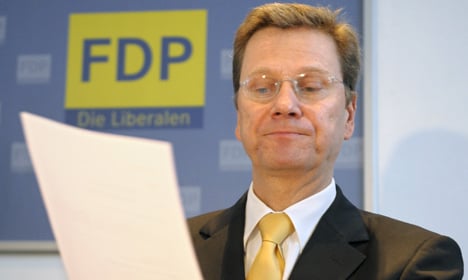Though the pro-business party had hoped the assessment would open up a chance to enact their tax reform proposals, daily Berliner Zeitung reported that the Finance Ministry’s prognosis points to significantly shrinking tax revenues on federal, state and municipal levels for the coming years, leaving little room for further cuts.
Preliminary figures obtained by the paper show that experts believe losses could reach €40 billion by 2013. The final report will be released on Thursday.
According to the Macroeconomic Policy Institute (IMK) tax revenue is set to drop by about three percent, or €14 billion this year despite economic recovery, with municipalities facing the biggest losses.
Chancellor Angela Merkel’s Christian Democrats (CDU) and their coalition partners created a shortfall of €6 billion thanks to their stimulus package, the paper said.
But the Free Democrats continue to trumpet their new tax plan, even as senior members of their conservative coalition partners, the CDU, attack the proposals.
The simmering tension in the government coalition over tax reform proposals has continued beneath the surface even as the government scrambled to deal with crises such as the Icelandic volcano ash cloud, Afghanistan and Greece.
The new tax plan, a slimmed-down version in recognition of Germany’s massive public debt, would deliver relief totalling €16 billion and simplify the income tax system, leaving only five tax brackets. Originally the party had wanted to deliver €24 billion in relief and have just three tax brackets.



 Please whitelist us to continue reading.
Please whitelist us to continue reading.
Member comments